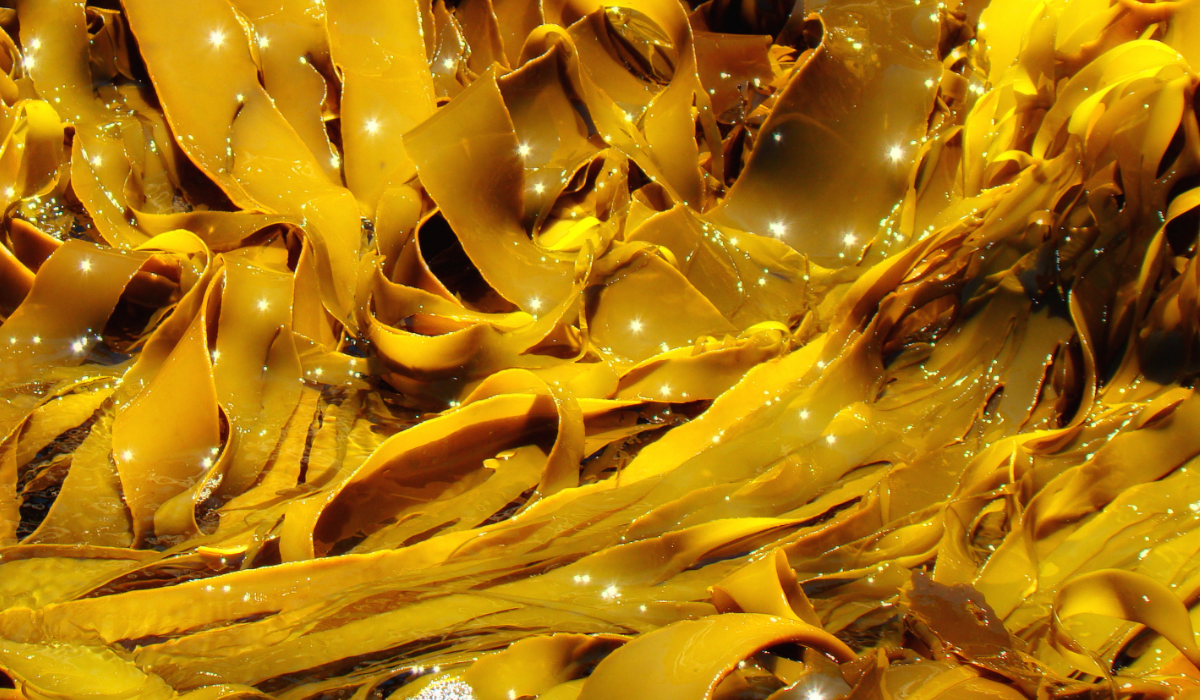Image Source: Wikipedia
Ascophyllum nodosum, also commonly known as kelp, is a vegetable of the sea that grows in nutrition filled cold water. It is used as a supplement that is high in phlorotannins and decreases stress, senescence, and inflammation. (1)
It is a long living species of seaweeds that’s able to produce identical cells through vegetative sprouting (from base) (2). Found as seaweed at the Northern Atlantic Ocean, it is also called Norwegian kelp, knotted kelp, egg wrack, and knotted wrack (3) they are also found in different variations of olive and brown color. They have leaf like parts that are long in size, with eggs that look like the shape of a bladder, and are placed separately from one another. They easily stick to the rocks due to holdfasts and are salty in taste (4).
Health benefits of kelp
It is used in capsule and tablet form and taken as a supplement. Studies indicate that ascophyllum nodosum extract can be taken every day, depending on the amount of mg consumed. It can be taken by adding it to a food product, only once a day (5).
It can also be consumed by mixing the powder in cold water.
According to scientists in Japan, a study that was undertaken on kelp had proven to give long life to the subject, in spite of the subject (mice) being fed on carcinogenic substances. Hence, it is factual that kelp has phenomenal elements to provide us with many health related benefits (6).
It has plenty of nutritional value and has high levels of iodine, calcium, potassium, iron, magnesium and much other nutrition. It is great for people who have nutritional deficiencies. According to expert studies, it is believed that almost a third of the world’s population is lacking iodine in their bodies. This creates large thyroid gland, breathing problems, and an increased heart rate (7).
Kelp seaweed is supposed to be the biggest source of iodine and spreads around 400 to 1000 percent of RDI. If you feel deprived of natural minerals, or are low on salt diet, kelp (ascophyllum nodosum) can be a great replacement/substitute.
It is a rich source of more than 50 minerals. It is widely used as a weight loss supplement and gives the same effect as that of the forskolin plant for weight loss. Additionally, it is proven to be beneficial for the immune system. It actively helps to safeguard your body against radioactive elements and harmful toxins. (8)
To further support the relation between ascophyllum nodosum and weight loss, a research was conducted using ID-aIG, when rats were fed ID-aIG (400mg/kg) for almost 9 weeks, in conjunction to a fat diet (high intensity), results showed that weight loss had occurred amongst the rats (9).
In a study conducted by researchers at the National Institute of Health, pure brown algae (fucoxanthin) was successfully used to treat the symptoms of urinary bladder cancer. Hence, kelp can prove beneficial for people at the risk of cancer (10).
Another study concluded that kelp ascophyllum nodosum reduces the following:
- Escherichia coli O157
- Escherichia coli O157:H7
These are diseases that are found in humans. However, further studies need to be carried out in this area to see if kelp can help in fighting these diseases.
People with high sugar levels may also benefit from kelp. In a study conducted on 23 subjects, brown seaweed kelp ascophyllum nodosum (500mg) was given to the participants 30 minutes before the consumption of carbohydrate product, such as bread (11). It was noted that there was a decrease of 12.1 percent of insulin, while an increase of 7.9 percent in cederholm index was also recorded.
The study therefore suggests that brown seaweed kelp can change insulin resistance in relation to the carbohydrate intake, and hence may prove to be beneficial for people at risk of diabetes. The response for men and women for both insulin and glucose were similar (12).
Side effects of kelp
These nutrition filled seaweeds may have the following potential side effects:
The high levels of iodine may cause a threat to your health.
When 15 percent of ascophyllum nodosum was used in diet of rats, the results were poor as traces of large toxicological signs were found. However, there was a notable difference in the urinary parameters. An increase in the urine level can be related to the content of choline found in the seaweed (13).
Besides, there may also be chances of high levels of toxicity, which is found in the sea weeds through absorbing of heavy metals or arsenic present in the water (14).
No information about ascophyllum nodosum is presented for pregnant females. Therefore, it is best for expecting mothers to avoid taking it.(15)
People experiencing thyroid diseases, dermatitis, or any other major disease should consult with their doctor before consuming kelp ascophyllum nodosum (16).
It can also cause allergies and stomach aches.
Dosage
On an average, a person needs around 150mcg of iodine. Therefore, it is recommended that daily intake of ascophyllum nodosum should be less, or around 1000 mcg only. Excess consumption can cause health issues. (17)
They are easily available as supplements in the form of tablets and in dried form. You can buy it from your local authorized pharmacy store or purchase them online as well.
Summary: Kelp can be deemed as one of the most vital sources of nutrition that we as humans need in our bodies. However, it should not be consumed in excess amounts. Also, it may have potential side effects if it does not comply with your body type, but currently there are no reports of toxicity in supplements containing ascophyllum nodosum.
http://bodynutrition.org/kelp/ http://bodynutritionorg.tumblr.com/post/147512197694

No comments:
Post a Comment